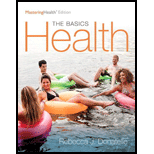
Health: The Basics, The Mastering Health Edition (12th Edition)
12th Edition
ISBN: 9780134183268
Author: Rebecca J. Donatelle
Publisher: PEARSON
expand_more
expand_more
format_list_bulleted
Question
Chapter 7, Problem 1PQ
Summary Introduction
To discuss: The characteristic features of addiction
Introduction:
Addiction is a chronic and complex disease that affects the function of the human brain and results in serious damage to relationships, families, neighborhoods, and workplace. This can be prevented by appropriate healthcare professionals in combination with peer or family support.
Expert Solution & Answer
Want to see the full answer?
Check out a sample textbook solution
Chapter 7 Solutions
Health: The Basics, The Mastering Health Edition (12th Edition)
Ch. 7 - Do you believe that an athletes admission of...Ch. 7 - Prob. 2WDYTCh. 7 - Prob. 3WDYTCh. 7 - Prob. 4WDYTCh. 7 - Prob. 5WDYTCh. 7 - Prob. 6WDYTCh. 7 - Prob. 1PQCh. 7 - Prob. 2PQCh. 7 - Prob. 3PQCh. 7 - Prob. 4PQ
Ch. 7 - Prob. 5PQCh. 7 - Prob. 6PQCh. 7 - Prob. 7PQCh. 7 - Prob. 8PQCh. 7 - Prob. 9PQCh. 7 - Prob. 10PQCh. 7 - Prob. 1TAICh. 7 - Prob. 2TAICh. 7 - Prob. 3TAICh. 7 - Prob. 4TAICh. 7 - Prob. 5TAICh. 7 - Do you think there is such a thing as responsible...Ch. 7 - Prob. 7TAICh. 7 - Why do you think many people today think that...Ch. 7 - Why do you think many people today think that...Ch. 7 - Prob. 10TAI
Knowledge Booster
Similar questions
- Your daughter is leaving for college in the fall. Recently, there has been disturbing news about the excessive drinking on college campuses and even a report about the death of one student who had been drinking excessively at the college your daughter is planning to attend. Form a group of four or five people. Each group has an imaginary daughter who is leaving for college. Each member of the group will choose one of the topics listed below' and prepare a short (one-minute) speech that attempts to educate your daughter on the dangers of excessive drinking. To facilitate the speakers delivery, a group member takes on the role of "daughter," rotating the role with each speaker. Be sure to emphasize facts as much as possible with your argument. Explain the physiology of the hangover, including dehydration, formaldehyde, and methanol. Discuss the role of alcohol in weight gain. Describe alcohols effect on vitamins. Describe the effect of alcohol on the heart and brain. Describe alcohol's effect on the liver and other organs.arrow_forwardSmoking powerfully raises the risk for CVD in men and women In all of the following ways except reducing the heart's workload. making blood clots more likely. directly damaging the heart with toxins, draising the blood pressure.arrow_forward
Recommended textbooks for you
- Lifetime Physical Fitness & WellnessHealth & NutritionISBN:9781337677509Author:HOEGERPublisher:Cengage
- Essentials of Pharmacology for Health ProfessionsNursingISBN:9781305441620Author:WOODROWPublisher:Cengage
 Comprehensive Medical Assisting: Administrative a...NursingISBN:9781305964792Author:Wilburta Q. Lindh, Carol D. Tamparo, Barbara M. Dahl, Julie Morris, Cindy CorreaPublisher:Cengage Learning
Comprehensive Medical Assisting: Administrative a...NursingISBN:9781305964792Author:Wilburta Q. Lindh, Carol D. Tamparo, Barbara M. Dahl, Julie Morris, Cindy CorreaPublisher:Cengage Learning

Lifetime Physical Fitness & Wellness
Health & Nutrition
ISBN:9781337677509
Author:HOEGER
Publisher:Cengage



Essentials of Pharmacology for Health Professions
Nursing
ISBN:9781305441620
Author:WOODROW
Publisher:Cengage


Comprehensive Medical Assisting: Administrative a...
Nursing
ISBN:9781305964792
Author:Wilburta Q. Lindh, Carol D. Tamparo, Barbara M. Dahl, Julie Morris, Cindy Correa
Publisher:Cengage Learning